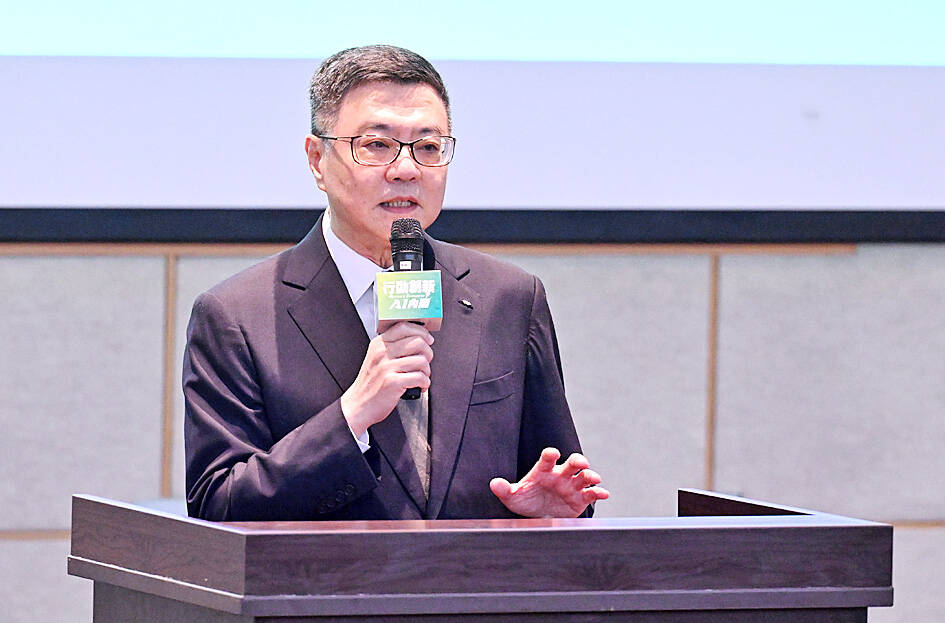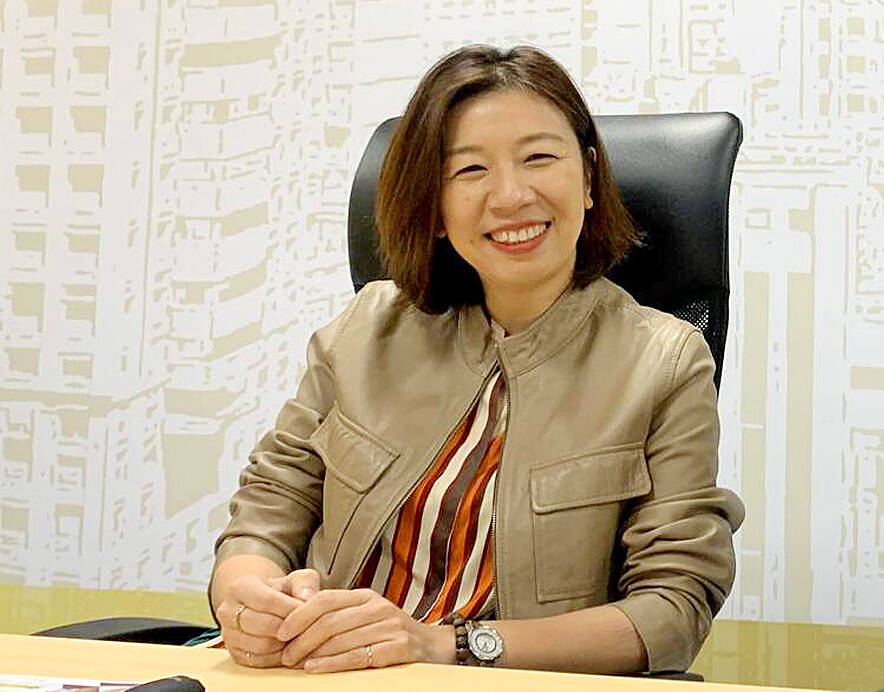The Democratic Progressive Party (DPP) yesterday announced 15 new deputy ministers, with premier-designate Cho Jung-tai (卓榮泰) saying he expects the ministries to work together to build a technologically innovative and public interest-focused administration.
Although the list did not include names for deputies in the Ministry of Foreign Affairs and the Ministry of Defense, minister of foreign affairs-designate Lin Chia-lung (林佳龍) has reportedly selected Representative to France Francois Wu (吳志中) as deputy minister, which Cho has agreed to.
Yesterday’s list showed that Maa Shyh-yuan (馬士元), an associate professor of urban planning and disaster management at Ming Chuan University, and Tung Chien-hung (董建宏), an associate professor at National Chung Hsing University’s landscape and recreation program, would become deputy ministers of the interior.

Photo: Liu Hsin-de, Taipei Times
The new deputy ministers of education would be former legislator Chang Liao Wan-chien (張廖萬堅) and Yeh Ping-cheng (葉丙成), a professor in National Taiwan University’s Department of Electrical Engineering.
During his two terms in the legislature, Chang Liao was on its Education and Culture Committee, while Yeh is the founder of online learning platform PaGamO and BTS, an experimental education institution for autonomous learning.
Former legislator Lin Ching-yi (林靜儀) and Civil Service Protection and Training Commission Deputy Minister Lue Jen-der (呂建德) were named deputy ministers of health and welfare.

Photo: Tsai Shu-yuan, Taipei Times
Lin was a gynecologist, while Lue, who was the director of the Taichung City Government’s Social Affairs Bureau, has expertise in National Health Insurance, political economy and social welfare.
The new deputy ministers of agriculture would be Agriculture and Food Agency Director-General Hu Jong-i (胡忠一) and Kaohsiung District Fishermen’s Association chairman Huang Chao-ching (黃昭欽).
Deputy Minister of Transportation and Communications Chen Yen-po (陳彥伯) would remain in his post, while Railway Bureau Director-General Wu Sheng-yuan (伍勝園) would become a new deputy minister of transportation and communications.
Deputy Minister of Digital Affairs Herming Chiueh (闕河鳴) would also remain in his position, while L Labs Inc (艾爾科技) president Lin Yi-jing (林宜敬) would become the other deputy minister.
Lin Yi-jing had been a researcher at IBM, a deputy manager of the engineering department at Compeq Manufacturing Co (華通電腦) and director of new product research and development at Trend Micro Inc.
National Taipei University law professor Chen Yen-liang (陳彥良) would become vice chairman of the Financial Supervisory Commission, while National Taiwan University Department of Bio-Industry Communication and Development professor Peng Li-pei (彭立沛) would be deputy minister of the National Development Council.
National Taiwan University School of Design and Innovation dean Chen Bing-Yu (陳炳宇) and National Applied Research Laboratories president Lin Faa-jeng (林法正) were named National Science and Technology Council deputy ministers.
The new Public Construction Commission deputy ministers would be Taiwan Jury Association president Chen Wei-hsiang (陳為祥) and Pingtung County Department of Urban and Rural Development director Lee Yi-der (李怡德).
Deputy ministers of finance Frank Juan (阮清華) and Lee Ching-hua (李慶華), deputy ministers of environment Yeh Jiunn-Horng (葉俊宏) and Shih Wen-chen (施文真), deputy ministers of culture Lee Ching-hwi (李靜慧) and Sue Wang (王時思), deputy ministers of labor Wang An-pang (王安邦) and Hsu Chuan-sheng (許傳盛), and Deputy Minister of Economic Affairs Chen Chern-chyi (陳正祺) would remain in their posts.

Intelligence agents have recorded 510,000 instances of “controversial information” being spread online by the Chinese Communist Party (CCP) so far this year, the National Security Bureau (NSB) said in a report yesterday, as it warned of artificial intelligence (AI) being employed to generate destabilizing misinformation. The bureau submitted a written report to the Legislative Yuan in preparation for National Security Bureau Director-General Tsai Ming-yen’s (蔡明彥) appearance before the Foreign Affairs and National Defense Committee today. The CCP has been using cognitive warfare to divide Taiwanese society by commenting on controversial issues such as Taiwan Semiconductor Manufacturing Co’s (TSMC, 台積電) investments in the

HELPING HAND: The steering committee of the National Stabilization Fund is expected to hold a meeting to discuss how and when to utilize the fund to help buffer the sell-off The TAIEX plunged 2,065.87 points, or 9.7 percent, to close at 19,232.35 yesterday, the highest single-day percentage loss on record, as investors braced for US President Donald Trump’s tariffs after an extended holiday weekend. Amid the pessimistic atmosphere, 945 listed companies led by large-cap stocks — including Taiwan Semiconductor Manufacturing Co (TSMC, 台積電), Hon Hai Precision Industry Co (鴻海精密) and Largan Precision Co (大立光) — fell by the daily maximum of 10 percent at the close, Taiwan Stock Exchange data showed. The number of listed companies ending limit-down set a new record, the exchange said. The TAIEX plunged by daily maxiumu in just

INVESTIGATION: The case is the latest instance of a DPP figure being implicated in an espionage network accused of allegedly leaking information to Chinese intelligence Democratic Progressive Party (DPP) member Ho Jen-chieh (何仁傑) was detained and held incommunicado yesterday on suspicion of spying for China during his tenure as assistant to then-minister of foreign affairs Joseph Wu (吳釗燮). The Taipei District Prosecutors’ Office said Ho was implicated during its investigation into alleged spying activities by former Presidential Office consultant Wu Shang-yu (吳尚雨). Prosecutors said there is reason to believe Ho breached the National Security Act (國家安全法) by leaking classified Ministry of Foreign Affairs information to Chinese intelligence. Following interrogation, prosecutors petitioned the Taipei District Court to detain Ho, citing concerns over potential collusion or tampering of evidence. The

‘COMPREHENSIVE PLAN’: Lin Chia-lung said that the government was ready to talk about a variety of issues, including investment in and purchases from the US The National Stabilization Fund (NSF) yesterday announced that it would step in to staunch stock market losses for the ninth time in the nation’s history. An NSF board meeting, originally scheduled for Monday next week, was moved to yesterday after stocks plummeted in the wake of US President Donald Trump’s announcement of 32 percent tariffs on Taiwan on Wednesday last week. Board members voted to support the stock market with the NT$500 billion (US$15.15 billion) fund, with injections of funds to begin as soon as today. The NSF in 2000 injected NT$120 billion to stabilize stocks, the most ever. The lowest amount it